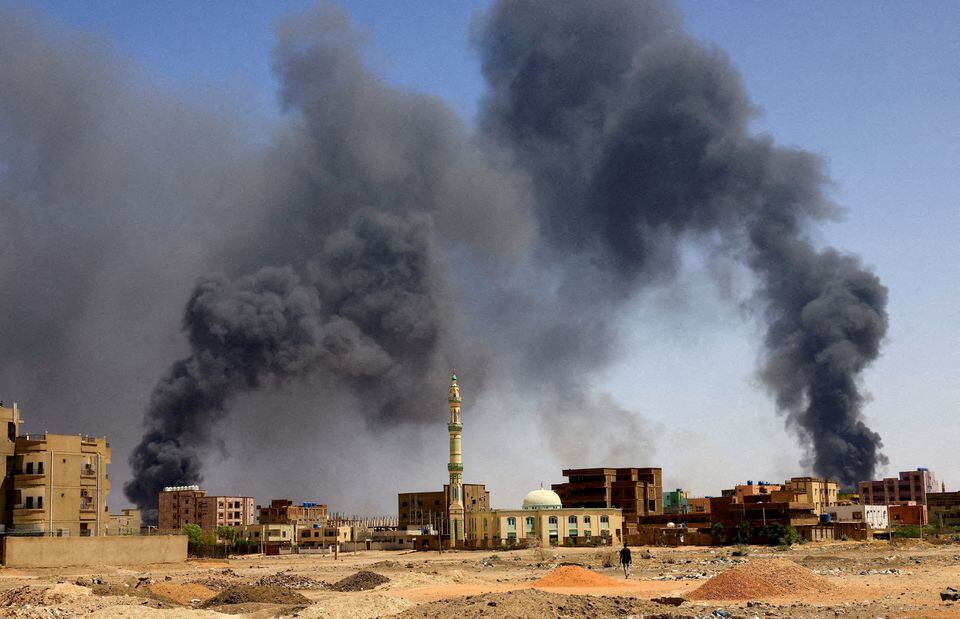
Production sectors in Sudan face an economic crisis
Agencies - moatinoon
As the war in Sudan approaches its first anniversary, the countrys economy is facing a real crisis due to the paralysis that has affected the production sectors, the halt of export movements, the depreciation of the national currency, and an 80% decline in public revenues.
According to Sudanese economic analysts, the contraction of the Gross Domestic Product (GDP) has been the most prominent feature of the decline in the performance of the Sudanese economy due to the ongoing war since mid-April 2023.
Sudanese economic analyst Abdel Khaleq Mahjoub said, "According to official estimates, there has been a significant contraction in the growth of the Gross Domestic Product by 40%."
Mahjoub added in a statement to Xinhua News Agency on Tuesday, "The war has had a profound impact on the performance of productive economic sectors that represent the pillars of the Sudanese economy, such as the industrial, agricultural, mining, and services sectors."
He pointed to the decline in the performance of the agricultural sector in Sudan, which constitutes 48% of the Gross Domestic Product.
Abdel Qader Abdoun, a member of the Union of Farmers in North Sudan, said that the agricultural sector "was affected by the loss of funding and production inputs such as fertilizers, seeds, and fuel."
He added that North Sudan "is considered one of the main agricultural regions in Sudan, and due to the war, our agricultural activity has decreased this year, and cultivated areas have decreased due to farmers inability to finance agricultural operations, the high prices of fuel, and the continuous power outages."
According to a report by the Sudanese Agricultural Bank, a government bank specialized in financing agricultural activities in Sudan, the cultivated area in the country decreased by 60% compared to previous years.
Due to the decline in agricultural activity, the United Nations Office for the Coordination of Humanitarian Affairs in Sudan (OCHA) expected, in its latest report, a decline in the upcoming harvest, and that the prices of basic foodstuffs would remain unusually high during the harvest season.
Sudanese economic analyst Ayoub Abdel Hafez pointed out that export movements decreased by about 60% due to the closure of Khartoum International Airport and the cessation of work at most dry ports.
Abdel Hafez said that the war "led to a decline in the volume of exports in vital areas such as livestock, gold, and gum Arabic, leading to a decline in the revenues of those exports."
Sudanese businessman Samani Abdullah, who works in the field of import and export, complained about the complications created by the war, which reduced the volume of their business.
He said, "The war has destroyed our commercial activity in my fields of import and export, and the closure of Khartoums main airport has disrupted the movement of exports and imports, and the alternative airport is Port Sudan, which is very far and increases the cost of transportation and shipping."
He added that "there is a second obstacle represented in the decision of the Ministry of Finance to raise the value of the customs dollar, which is an indicator of the tariff, as it reached 950 pounds instead of 650 pounds."
Abdullah believed that the closure of about 60% of the branches of major banks in the country paralyzed the movement of the import and export sector due to the loss of funding and bank credits.
Since the outbreak of the conflict in April 2023, the Sudanese pound has continued its continuous decline against foreign currencies, losing more than 50% of its value, as the dollar is currently traded at more than 1,250 Sudanese pounds, compared to 600 pounds before the war.
According to statistics from the International Monetary Fund, the war raised the unemployment rate in Sudan from 32.14% in 2022 to 47.2% in 2024, while a study by the American Institute for Food Policy expected a loss of 5 million jobs in Sudan due to the war.
According to the International Monetary Fund, the inflation rate in Sudan has risen to 256.17%, which means an increase of 117.4%, while the Sudanese government has not issued any reports on the inflation rate amid the war.
Sudanese Finance Minister Jibril Ibrahim recently announced a more than 80% decline in the countrys revenues due to the developments of the war between the army and the Rapid Support Forces since April 15 last year.
The United Nations says that more than half of Sudans population, which exceeds 48 million people, now needs assistance, including 18 million people facing acute food insecurity.
According to the Armed Conflict Location & Event Data Project, the fighting has led to the death of more than 14,000 civilians.
According to the United Nations Office for the Coordination of Humanitarian Affairs in Sudan (OCHA), more than 8.1 million people have fled the fighting inside Sudan and to neighboring countries.

